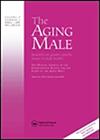Androgen deprivation therapy and depression in the prostate cancer patients: review of risk and pharmacological management
IF 2.7
4区 医学
Q3 ENDOCRINOLOGY & METABOLISM
引用次数: 4
Abstract
Abstract Purpose: Despite the effectiveness of androgen deprivation therapy in advanced prostate cancer, serious neuropsychiatric consequences in androgen deprivation therapy (ADT)-treated patients, mainly depression, have been concerning and gained more attention recently. This narrative review aims to shed light on the risk and pharmacological management of ADT-induced depression in PCa patients. Methods: We searched PubMed, Scopus and Google Scholar databases using MESH keywords “Prostate cancer OR prostate neoplasm” AND “Depression” AND “Androgen Deprivation Therapy” AND “antidepressants”. Search was limited to English and studies conducted on humans. Studies’ titles and abstracts were screened, and further information were obtained from the text, if necessary, to decide whether studies are to be included in this review. Results: Our review revealed 23 studies confirming the occurrence and worsening of depressive symptoms in ADT-treated patients, which frequently require pharmacological interventions; whereas 10 studies indicated otherwise. All studies were prospective, retrospective, cross-sectional or case reports. Based on the incidence of depression provided by the observational studies, the average among ADT-treated patients was 18.23% (range: 2.1–46.9%), while it was 8.42% (range: 1.4–23.3%) in the non-ADT patients. Although several treatments have been used for depression in cancer patients, current knowledge lacks observational and controlled studies as well as clinical guidelines that demonstrate efficacy and safety of antidepressants and guide clinicians to the appropriate treatment in these patients, respectively. On the other side, a few clinical studies have been published regarding the efficacy of selective serotonin reuptake inhibitors, selective serotonin and norepinephrine reuptake inhibitors and/or saftey on other ADT associated adverse effects. Conclusions: Our work supports the recent attention towards mood issues as an adverse effect of ADT, and that greater awareness of this is warranted among clinicians. Clinical studies published regarding the use of antidepressants for other ADT associated adverse effects established the foundation that can be adopted to examine these therapies on ADT-induced depression.癌症前列腺患者的雄激素缺乏治疗与抑郁症:风险和药物管理综述
摘要目的:尽管雄激素剥夺治疗对晚期前列腺癌有效,但近年来,雄激素剥夺治疗(ADT)患者严重的神经精神后果(主要是抑郁症)引起了人们的关注和关注。这篇叙述性综述旨在阐明前列腺癌患者adt诱导抑郁的风险和药物管理。方法:使用MESH关键词“前列腺癌或前列腺肿瘤”、“抑郁症”、“雄激素剥夺疗法”和“抗抑郁药”检索PubMed、Scopus和谷歌Scholar数据库。搜索仅限于英语和对人类的研究。对研究的标题和摘要进行筛选,并在必要时从文本中获得进一步的信息,以决定是否将研究纳入本综述。结果:我们回顾了23项研究,证实了adt治疗患者抑郁症状的发生和恶化,这往往需要药物干预;然而,有10项研究表明并非如此。所有研究均为前瞻性、回顾性、横断面或病例报告。根据观察性研究提供的抑郁发生率,adt治疗患者的平均抑郁发生率为18.23%(范围:2.1-46.9%),而非adt患者的平均抑郁发生率为8.42%(范围:1.4-23.3%)。虽然已经有几种治疗方法用于治疗癌症患者的抑郁症,但目前的知识缺乏观察性和对照研究,以及临床指南来证明抗抑郁药的有效性和安全性,并指导临床医生分别对这些患者进行适当的治疗。另一方面,关于选择性5 -羟色胺再摄取抑制剂、选择性5 -羟色胺和去甲肾上腺素再摄取抑制剂的疗效和/或其他ADT相关不良反应的安全性的临床研究已经发表。结论:我们的工作支持了最近对情绪问题作为ADT副作用的关注,并且临床医生有必要对此有更多的认识。发表的关于使用抗抑郁药治疗其他ADT相关不良反应的临床研究,为检验这些治疗ADT诱发抑郁症的方法奠定了基础。
本文章由计算机程序翻译,如有差异,请以英文原文为准。
求助全文
约1分钟内获得全文
求助全文
来源期刊

Aging Male
医学-泌尿学与肾脏学
CiteScore
6.40
自引率
3.80%
发文量
33
审稿时长
>12 weeks
期刊介绍:
The Aging Male , the official journal of the International Society for the Study of the Aging Male, is a multidisciplinary publication covering all aspects of male health throughout the aging process. The Journal is a well-recognized and respected resource for anyone interested in keeping up to date with developments in this field. It is published quarterly in one volume per year.
The Journal publishes original peer-reviewed research papers as well as review papers and other appropriate educational material that provide researchers with an integrated perspective on this new, emerging specialty. Areas of interest include, but are not limited to:
Diagnosis and treatment of late-onset hypogonadism
Metabolic syndrome and related conditions
Treatment of erectile dysfunction and related disorders
Prostate cancer and benign prostate hyperplasia.
 求助内容:
求助内容: 应助结果提醒方式:
应助结果提醒方式:


